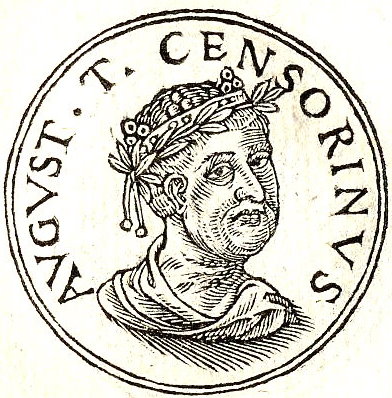Censorinus (usurper) on:
[Wikipedia]
[Google]
[Amazon]
 Appius Claudius CensorinusSmith (1844), p. 665 was a fictional
Appius Claudius CensorinusSmith (1844), p. 665 was a fictional
Weigel, Richard D., "Claudius II Gothicus (268-270)", ''De Imperatoribus Romanis''
{{DEFAULTSORT:Censorinus 269 deaths 270 deaths Thirty Tyrants (Roman) Year of birth unknown Claudii
 Appius Claudius CensorinusSmith (1844), p. 665 was a fictional
Appius Claudius CensorinusSmith (1844), p. 665 was a fictional usurper
A usurper is an illegitimate or controversial claimant to power, often but not always in a monarchy. In other words, one who takes the power of a country, city, or established region for oneself, without any formal or legal right to claim it as ...
against Roman Emperor Claudius II
Marcus Aurelius Claudius "Gothicus" (10 May 214 – January/April 270), also known as Claudius II, was Roman emperor from 268 to 270. During his reign he fought successfully against the Alemanni and decisively defeated the Goths at the Battle ...
, (in ca AD 269) according to the unreliable ''Historia Augusta
The ''Historia Augusta'' (English: ''Augustan History'') is a late Roman collection of biographies, written in Latin, of the Roman emperors, their junior colleagues, designated heirs and usurpers from 117 to 284. Supposedly modeled on the si ...
''. He is included in the list of the Thirty Tyrants
The Thirty Tyrants ( grc, οἱ τριάκοντα τύραννοι, ''hoi triákonta týrannoi'') were a pro-Spartan oligarchy installed in Athens after its defeat in the Peloponnesian War in 404 BC. Upon Lysander's request, the Thirty were elec ...
.
It is claimed that he had a lengthy career, having served twice as a consul
Consul (abbrev. ''cos.''; Latin plural ''consules'') was the title of one of the two chief magistrates of the Roman Republic, and subsequently also an important title under the Roman Empire. The title was used in other European city-states throu ...
, twice as a praetorian prefect
The praetorian prefect ( la, praefectus praetorio, el, ) was a high office in the Roman Empire. Originating as the commander of the Praetorian Guard, the office gradually acquired extensive legal and administrative functions, with its holders be ...
, thrice as a praefectus urbi
The ''praefectus urbanus'', also called ''praefectus urbi'' or urban prefect in English, was prefect of the city of Rome, and later also of Constantinople. The office originated under the Roman kings, continued during the Republic and Empire, a ...
, and four times as a proconsul
A proconsul was an official of ancient Rome who acted on behalf of a consul. A proconsul was typically a former consul. The term is also used in recent history for officials with delegated authority.
In the Roman Republic, military command, or ' ...
. He served under Valerian in the Roman–Persian Wars
The Roman–Persian Wars, also known as the Roman–Iranian Wars, were a series of conflicts between states of the Greco-Roman world and two successive Iranian empires: the Parthian and the Sasanian. Battles between the Parthian Empire and the ...
and was wounded in combat. His wounds forced him to retire from military service. He was already an old man and long retired when the troops of Bononia revolted and proclaimed him an Augustus
Caesar Augustus (born Gaius Octavius; 23 September 63 BC – 19 August AD 14), also known as Octavian, was the first Roman emperor; he reigned from 27 BC until his death in AD 14. He is known for being the founder of the Roman Pr ...
. He was killed by his own soldiers, because he enforced too strict discipline. His reign lasted only a few days.Smith (1844), p. 665
The entire account is a fabrication. His name and career are meant to reflect traditional Roman values, and may form part of the author's agenda when he wrote the ''Historia Augusta''.Rohrbacher, D. ''The Play of Allusion in the Historia Augusta'' (2016), p. 118
Francisco Mediobarbo Birago, a 17th-century numismatist
A numismatist is a specialist in numismatics ("of coins"; from Late Latin ''numismatis'', genitive of ''numisma''). Numismatists include collectors, specialist dealers, and scholars who use coins and other currency in object-based research. Altho ...
, reported the existence of a coin commemorating the 3rd year of Censorinus' reign. The lack of sources for such a coin make it likely that it was a forgery of some kind.Smith (1844), p. 665 Louis-Sébastien Le Nain de Tillemont
Louis-Sébastien Le Nain de Tillemont (30 November 163710 January 1698) was a French ecclesiastical historian.
Life
He was born in Paris into a wealthy Jansenist family, and was educated at the ''Petites écoles'' of Port-Royal, where his histori ...
suggested that Censorinus and Victorinus
Marcus Piavonius VictorinusSome of the inscriptions record his name as M. Piavvonius Victorinus, as does the first release of coins from the Colonia mint. A mosaic from Augusta Treverorum (Trier) lists him as Piaonius. was emperor in the Gallic ...
could be the same person.Smith (1844), p. 665
References
Sources
*Weigel, Richard D., "Claudius II Gothicus (268-270)", ''De Imperatoribus Romanis''
{{DEFAULTSORT:Censorinus 269 deaths 270 deaths Thirty Tyrants (Roman) Year of birth unknown Claudii